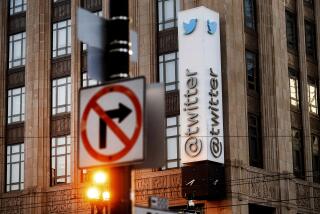Twitter CEO Dick Costolo wants to disclose more on data requests
SAN FRANCISCO -- Twitter has remained mum on why it is one of the top Internet companies not to cooperate with the National Security Agency’s clandestine surveillance program PRISM, though it was approached by intelligence officials.
Twitter Chief Executive Dick Costolo did not shed any light on the subject but said Wednesday that Twitter has a “principled” policy on national security data requests and pushes back in some cases to shield the privacy of its users.
Costolo said Twitter would like to reveal more information about data requests from national intelligence officials in solidarity with Google, which is pushing to peel back the layers of secrecy that encompass the program. Google has asked the Foreign Intelligence Surveillance Court to allow the company to speak about the information it is required to provide.
Twitter pushes back on “broad requests” from the government and tries to give users as much disclosure as possible, Costolo said.
“We have been very clear about having … a principled policy around access to user data,” Costolo said. “When we receive valid legal requests in countries in which we operate, we will abide by the rule of law … and comply with that legal request.”
“We are very transparent about the requests we get,” he added.
Twitter plans to release a midyear report in July that will detail all of the requests it receives from governments the world over.
It’s in Twitter’s DNA to stand up for free expression and privacy. The company’s top lawyer, Alex Macgillivray, is fond of saying that Twitter is “the free speech wing of the free speech party.”
ALSO:
NSA revelations threaten worldwide trust in Facebook, Google
Google wants to reveal how many secret security requests it gets
Tech execs urge U.S. to help clear their names in NSA surveillance
More to Read
Inside the business of entertainment
The Wide Shot brings you news, analysis and insights on everything from streaming wars to production — and what it all means for the future.
You may occasionally receive promotional content from the Los Angeles Times.










